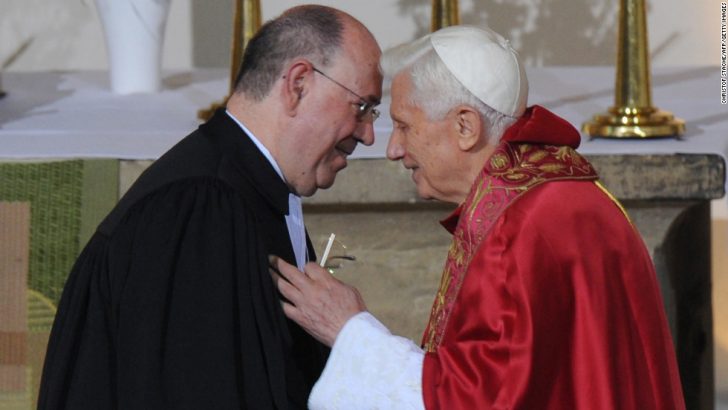Pope Francis’ praise for Luther continues the work of his predecessor, writes Greg Daly
Pope Francis’ praise for Martin Luther ahead of and during his visit to Lund last year – notably when he said that Luther’s intentions and his understanding of justification were not mistaken – may have sounded startling to some ears, but as so often with the Pope, he was simply building on his predecessors’ work.
Formal Catholic-Lutheran ecumenical dialogue began in 1964 as a fruit of the Second Vatican Council, which a small number of Lutherans had attended as observers. There they heard, for instance, Strasbourg’s Archbishop Léon Elchinger speak of how Catholics owed a debt to non-Catholics for developments in biblical scholarship and of how the Reformation’s Protestant communities had highlighted the truth and role of justification by faith in Christianity.
This was a far cry from how Protestants had been spoken of in the First Vatican Council, and augured well for the council’s decree on ecumenism, Unitatis Redintegratio. Meetings and dialogue between Catholics and Lutherans have carried on to this day, with one highlight of the process being in November 1983.
That month, in a letter to mark the 500th anniversary of Luther’s birth, St John Paul II wrote to Cardinal Johannes Willebrands, president of the Secretariate for Christian Unity, calling for Catholics to meditate in truth and Christian charity on the Reformation. Of Luther himself, the Pope said his “profound piety that, with burning passion, was driven by questioning on eternal salvation, is clearly delineated”.
That a Pope should speak so admiringly of Luther’s “profound piety” would have been striking enough; a few weeks later he visited and preached in Rome’s Evangelical Lutheran church.
Understanding
1999 would see a far more dramatic event in the signing of the Joint Declaration on the Doctrine of Justification, with the Church and the Lutheran World Federation proclaiming that they share “a common understanding of our justification by God’s grace through faith in Christ”.
In this, they addressed one of the key issues of the Reformation, agreeing that “by grace alone, in faith in Christ’s saving work and not because of any merit on our part, we are accepted by God and receive the Holy Spirit, who renews our hearts while equipping us and calling us to good works”.
Subsequently signed in 2006 by the World Methodist Council and this July by the leadership of the World Communion of Reformed Churches, the document was recognised as having been made possible by the then Prefect of the Vatican’s Congregation of the Faith, Cardinal Joseph Ratzinger.
Described in 1998 by Wolfgang Huber, president of the Council of the Evangelical Church in Germany and onetime Lutheran Evangelical Bishop of Berlin as “one of the few who really know Luther”, Cardinal Ratzinger was clearly someone who had read Luther deeply and been profoundly influenced by him.
Even before entering university the young Joseph Ratzinger had read all of Luther’s works from before the Reformation – in 1998 he would urge Protestant interlocutors to “rediscover the Luther of those years” – and as a seminarian he had sought closer relations with Lutherans.
As a professor in the University of Regensburg in 1976 he said it might be possible to interpret the Augsburg Confession, the first Lutheran declaration of faith, as a Catholic document, and interviewed in 1984, he spoke warmly of the 20th-Century shift, based on serious historical work, in Catholic understandings of Luther. He distinguished between Luther’s catechism, songs, and liturgical directives which can be interpreted with his “evangelical churchliness” in mind, and his polemical works, which he said should be read bearing in mind Luther’s piety.
Given such familiarity with Luther, it is perhaps unsurprising that the then Cardinal Ratzinger would play an instrumental role in resolving apparently insurmountable difficulties in the joint declaration on justification. As the Evangelical Lutheran Church of America’s Bishop George Anderson said: “It was Ratzinger who untied the knots – without him we might not have an agreement.”
As Pope Benedict XVI in November 2008, he would tell a general audience in Rome that “Luther’s phrase ‘faith alone’ is true, if it is not opposed to faith in charity, in love”, and in 2011 the German Pope would dramatically meet in Luther’s old Augustinian convent with the Council of the Evangelical Church in Germany.
“As the Bishop of Rome, it is deeply moving for me to be meeting you here in the ancient Augustinian convent in Erfurt. As we have just heard, this is where Luther studied theology. This is where he celebrated his first Mass,” he said, adding that Luther’s lifelong grappling with the question of how he could receive God’s grace never ceased to make a deep impression on him.
Spirituality
Recalling how thoroughly Christocentric Luther’s whole thinking and spirituality were, he said: “The question: what is God’s position towards me, where do I stand before God? – Luther’s burning question must once more, doubtless in a new form, become our question too, not an academic question, but a real one.”
On the flight to Germany, the Pontiff had been asked about the ecumenical significance of the trip, and had said that “to deepen the unity between Catholics and Evangelicals is essential at this precise moment in history”, adding that in this “time of secularism”, Christians have the mission of coming together to make present the message of Christ.
It should be clear to all of us, then, that when Pope Francis spoke last year in praise of Luther, appealing for unity in a time of secularism and persecution, he was simply taking the baton from his predecessors, and running with it.


 Greg Daly
Greg Daly Pope Benedict XVI is welcomed by the Rev. Nikolaus Schneider, head of the Evangelical Church in Germany, in the former Augustinian monastery in Erfurt. Photo: CNS
Pope Benedict XVI is welcomed by the Rev. Nikolaus Schneider, head of the Evangelical Church in Germany, in the former Augustinian monastery in Erfurt. Photo: CNS 